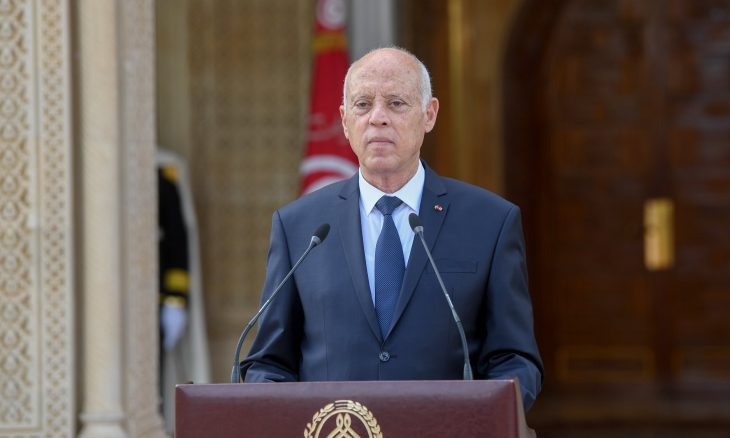Tunisian president condemns violence, denies crackdown on freedoms

Tunisian President Kais Saied responded on Thursday to his critics and those who accuse him of suppressing freedoms, which are often accusations made by his opponents who were harmed by the July 25 measures that almost isolated the former regime. He confirmed that “freedoms are guaranteed in Tunisia more than ever” while expressing his strong rejection of “violence” after a demonstration that saw the violent intervention of security forces to break up it last week.
During his meeting with Interior Minister Taoufik Charfeddine, he said, according to a video posted on the official Facebook page of the Tunisian presidency, “We reject the manifestations of violence and abuse by any party, especially those who want to strike the state”, stressing “the application of the law to everyone”. He also confirmed that “there is no intention to bring the judiciary to its knees or interfere in it, but the Tunisian people will not be left to all those who trade their rights”.
In violence unheard of in the capital for 10 years, police used water cannons, tear gas and batons to disperse protesters and carried out dozens of arrests in what rights and civil organizations described as “violent” during last Friday’s demonstration to commemorate the 2011 revolution and to denounce Saied’s decisions.
Also on Wednesday, the public prosecutor’s office in Tunis announced an investigation into the death of a person following the demonstration during which dozens of people were arrested and some journalists were assaulted.
On Saturday, more than two dozen Tunisian NGOs denounced the police repression and barbaric assault on journalists and protesters during the protests.
During the demonstration, the correspondent of Liberation newspaper, Jeune Afrique magazine and Radio France Inter was subjected to a violent beating from the police in Tunisia, to prevent him from covering the protests, according to the newspaper, radio and the North African Foreign Correspondents Club.
Since the 2011 revolution that toppled the Ben Ali regime, political gains have been made in the country, most notably freedom of demonstration and expression. However, there has been widespread criticism of Said since he assumed power, suspended parliament and dismissed the former prime minister on July 25th, which his opponents described as a coup against legitimacy and the constitution.
Reporters without Borders on Wednesday called on the Tunisian president to preserve freedom of the press and expression, one of the gains of the 2011 revolution that sparked the “Arab Spring in the region.
The organization published its report on “The press in Tunisia: The moment of truth”, in which it expressed the sounding of the alarm and that the reality of the media in Tunisia is witnessing a turning point in its history, warning of the danger of diluting the gains of the revolution.
Since his dismissal of the former Ennahdha-dominated regime, the Tunisian president has been facing intense external and domestic pressure and accusations of monopolization, which he categorically denies, asserting that the exceptional measures are nothing but a correction of the course of the revolution and a fight against corruption.
Kais Saied accuses the former regime of corruption, squandering public funds and impoverishing the people. He vowed to hold those responsible to account and said that no one is above the law.












